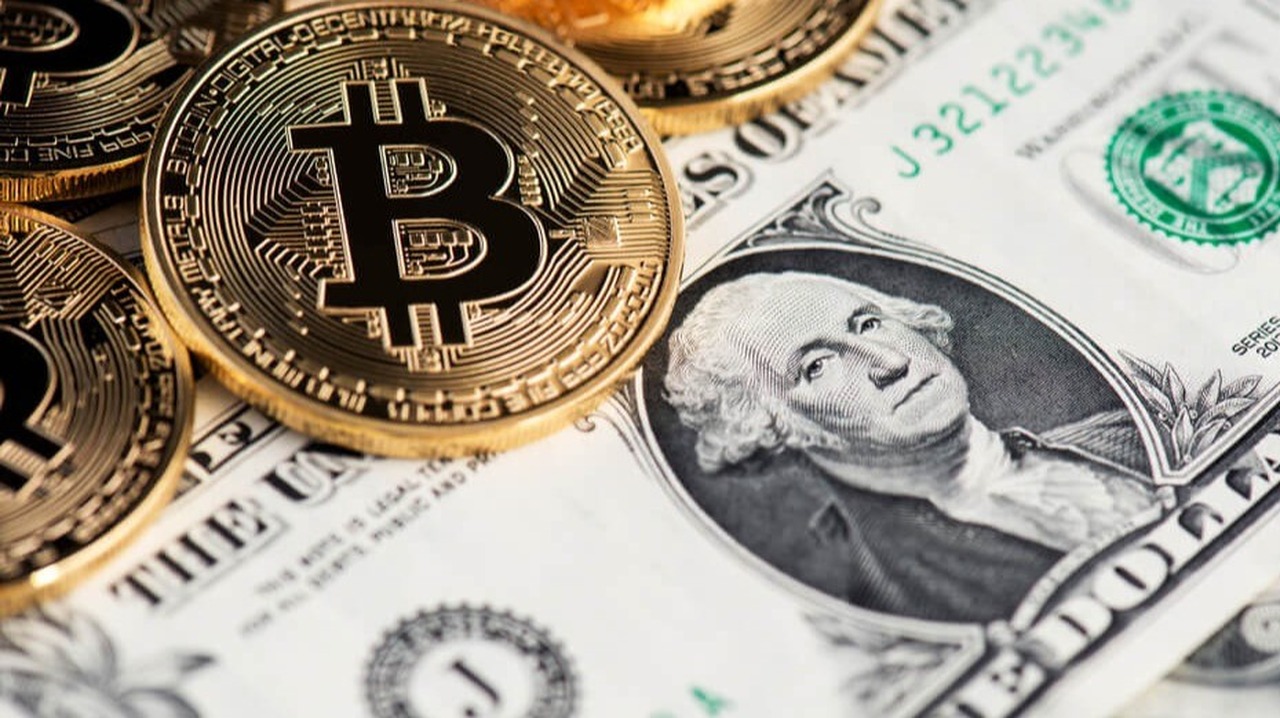

Is Bitcoin a Threat to the U.S. Dollar?
The discussion around Bitcoin’s potential to challenge the U.S. dollar as the world’s reserve currency is heating up. It’s no longer just a niche conversation among tech enthusiasts or cryptocurrency investors—prominent financial leaders are weighing in, including figures like Lloyd Blankfein, the former CEO of Goldman Sachs. In this article, we’ll delve into why Bitcoin is gaining attention and explore whether it could actually pose a threat to the U.S. dollar’s dominant position in the global financial system.
The Rise of Bitcoin
Bitcoin, often called “digital gold,” has undergone a meteoric rise in value and influence over the past few years. What started as a decentralized digital currency with an uncertain future has now surpassed the market cap of silver and is edging closer to the $100,000 mark per coin. This impressive growth has sparked the debate over whether Bitcoin could one day rival traditional fiat currencies, especially the U.S. dollar.
Bitcoin’s Key Characteristics
Bitcoin’s appeal can be traced to several key factors that set it apart from traditional currencies:
- Scarcity: There will only ever be 21 million Bitcoins in existence. This limited supply mirrors precious metals like gold, making it attractive to investors who value scarcity.
- Decentralization: Unlike the U.S. dollar, which is controlled by the U.S. government, Bitcoin operates on a decentralized network. This makes it resistant to manipulation and government intervention.
- Global Adoption: Countries such as El Salvador have adopted Bitcoin as legal tender, signaling a shift toward broader acceptance of cryptocurrencies as part of the global economy.
These factors have led to a growing interest in Bitcoin as a store of value, an investment asset, and potentially even a medium of exchange. The question now is whether Bitcoin could truly challenge the U.S. dollar’s supremacy on the global stage.
Blankfein’s Perspective
Lloyd Blankfein, who has a wealth of experience in global finance, recently remarked that Bitcoin could potentially be seen as a competitor to the U.S. dollar in the context of reserve currencies. His comments signal a shift in attitude toward Bitcoin—from skepticism to an acknowledgment of its growing influence.
In his view, Bitcoin’s rise could have significant implications for U.S. economic and geopolitical strategy. This is particularly important when considering U.S. policies that could encourage Bitcoin’s further integration into the global financial system. Blankfein’s remarks indicate that Bitcoin is no longer just a digital curiosity but could be poised to challenge traditional financial structures.
The Potential Impact of a Bitcoin Reserve
Blankfein acknowledged that if Bitcoin continues to gain acceptance, it could impact the global reserve currency system. The dollar’s status as the world’s primary reserve currency has been a cornerstone of U.S. trade and foreign policy for decades. Should Bitcoin become more widely adopted, it could reduce reliance on the U.S. dollar in international transactions.
The rise of Bitcoin could challenge the dollar’s position as the world’s dominant reserve currency, but it is unlikely to replace the dollar overnight.
If Bitcoin continues its upward trajectory and institutional investments pour in, it may force central banks and governments to rethink their monetary policies. While this is far from an immediate threat, it’s a conversation that is gaining more traction among global financial leaders.
Contrasting Views from Financial Leaders
While Blankfein’s comments reflect an evolving outlook on Bitcoin, many financial leaders remain cautious, and some outright reject the idea that Bitcoin poses a real challenge to the dollar.
Jerome Powell’s Position
Jerome Powell, the Chair of the Federal Reserve, has been one of the more vocal skeptics regarding Bitcoin’s potential to replace the U.S. dollar. In his view, Bitcoin functions more like gold than a traditional currency. Powell has pointed out the high volatility of Bitcoin’s price and its lack of widespread use as a daily payment method. According to Powell, Bitcoin is primarily a speculative asset, not a stable store of value that could rival fiat currencies like the dollar.
Powell’s concerns about Bitcoin’s volatility highlight a key challenge for its potential as a global currency.
Bitcoin’s price often swings dramatically within short periods, making it difficult to use as a stable medium of exchange. Until it becomes more stable, it is unlikely to replace the U.S. dollar in most everyday transactions.
The Dollar’s Resilience
Despite the growing interest in Bitcoin, Powell and other experts argue that the U.S. dollar remains firmly entrenched as the dominant global reserve currency. The dollar’s resilience can be attributed to several key factors:
- Established Trust: The U.S. dollar has been a reliable store of value for decades, and global investors continue to trust it in times of economic uncertainty.
- Global Trade: The majority of international transactions are conducted in dollars, reinforcing its dominance in global commerce.
- Government Backing: The U.S. government’s ability to manage monetary policy effectively—through institutions like the Federal Reserve—supports confidence in the dollar.
For now, the U.S. dollar’s standing remains unshaken. However, as Bitcoin and other cryptocurrencies grow, the dynamics of the global financial system may evolve.
The Future of Bitcoin and Traditional Currencies
As Bitcoin and other cryptocurrencies continue to gain ground, the future of traditional fiat currencies like the U.S. dollar is increasingly uncertain. There are several emerging trends that could shape the relationship between Bitcoin and the U.S. dollar in the coming years.
Institutional Adoption
One of the most significant developments in the cryptocurrency space is the increasing interest from institutional investors. Major corporations and financial institutions are now allocating portions of their portfolios to Bitcoin, signaling a shift in how cryptocurrencies are viewed by the traditional financial sector.
For example, MicroStrategy, a business intelligence company, has adopted an aggressive strategy of accumulating Bitcoin as part of its treasury reserves. This institutional interest could push Bitcoin’s price to new heights. Some analysts predict that if institutional adoption continues at its current pace, Bitcoin could see valuations upwards of $200,000 per coin by 2025.
Institutional adoption could play a key role in legitimizing Bitcoin and pushing it closer to becoming a mainstream financial asset.
However, this process will take time, and Bitcoin’s volatility remains a significant hurdle.
Regulatory Considerations
As cryptocurrencies gain mainstream attention, governments and regulatory bodies around the world will likely implement frameworks to oversee their use. The future of Bitcoin and other digital assets depends largely on how well these regulations are crafted.
Ensuring consumer protection will be crucial as more individuals enter the cryptocurrency market.
Regulators will need to address concerns around volatility, fraud, and market manipulation. They’ll also have to figure out how to integrate crypto assets with the traditional banking system without disrupting the broader financial ecosystem.
Conclusion
The debate over whether Bitcoin poses a real threat to the U.S. dollar is far from settled. While some financial leaders, like Lloyd Blankfein, acknowledge Bitcoin’s growing role in global finance, others, such as Jerome Powell, caution against viewing it as a serious competitor to fiat currencies.
The reality is that Bitcoin’s future is still uncertain. It may not immediately replace the U.S. dollar, but its rapid growth, coupled with increasing institutional adoption, suggests that it will continue to influence the global financial landscape. As Bitcoin matures and regulatory frameworks are established, it could become a more prominent player in global finance.
In conclusion, while Bitcoin may not pose an immediate threat to the U.S. dollar, its growing acceptance and increasing institutional interest signal that it will play a significant role in the future of global finance.
As we move forward, it will be interesting to see how Bitcoin’s relationship with traditional currencies evolves. The future is uncertain, but one thing is clear: the conversation about Bitcoin’s role in the financial system is just beginning.
Source:
- Donald Trump calls Bitcoin ‘a scam against the dollar’
- Expert View: Is Bitcoin really a threat to the US Dollar?
- Financial and market risks of bitcoin adoption as legal tender: evidence from El Salvador






